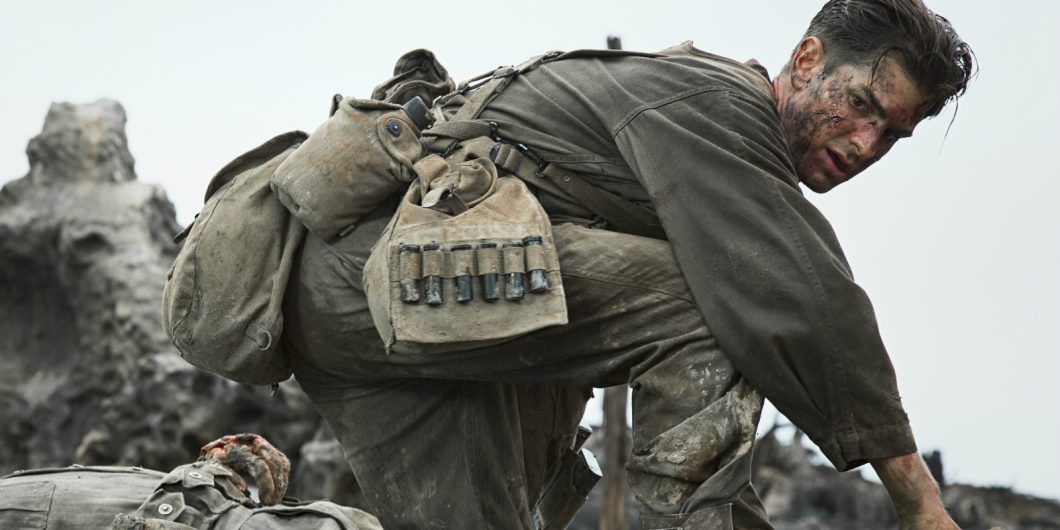Love Story
In war, sitting out protects one’s bodily safety. Sitting out of the morally messy struggles typical of adult human life protects one’s sense of superiority and innocence. Doing the good sometimes requires an odd courage: accepting the risk of getting the soul’s hands dirty. But how and how much to dirty one’s hands are difficult to discern.
Mel Gibson’s good but gory (and slightly corny) Hacksaw Ridge dramatizes the life of Desmond Doss, an Army medic at the Battle of Okinawa in 1945. His unit was ordered to retreat but Doss stayed, scouring the enemy-controlled field for wounded and lowering them with a rope 400 feet down the Hacksaw Ridge cliff. His Medal of Honor citation recounts how, among other heroic acts, “Pfc. Doss refused to seek cover and remained in the fire-swept area with the many stricken, carrying them one by one to the edge of the escarpment and there lowering them on a rope-supported litter down the face of a cliff to friendly hands.” He officially saved 75, but likely somewhere between 50 and 100 soldiers—the former was his estimate, the latter was the Army’s.
That courageous and charitable feat warrants a film in any case, but what especially interests Gibson are Doss’s convictions and his adherence to them in the face of derision and punishment.
A Seventh Day Adventist, Doss refused to hold a weapon but wanted to serve. He didn’t believe the “conscientious objector” status the Army gave him was accurate; instead he called himself a “conscientious cooperator.” During training, Doss suffered ridicule and abuse at the hands of his comrades. His superiors sought to have him discharged. The movie is as much about courage under friendly fire as under enemy fire.
Given Mel Gibson’s taste for (in the New Yorker’s words) “pornographic violence,” we may be surprised that he would direct a biopic celebrating a conscientious objector. In fact, Hacksaw Ridge is neither a war film nor an antiwar film. For Gibson, it is “a love story,” because Doss was “displaying the highest aspects of love for his fellow man.”
Desmond Doss, as Andrew Garfield portrays him in the film, seems not so much a pacifist, as someone with a personal vocation to save rather than slaughter. He never objects to the Allies’ fighting the war or to his comrades’ use of weapons. He eschews violence based on his family history and his own faith, which he understands that most others do not share. Doss is not preachy in his peace or in his creed.
The movie emphasizes the importance of having and holding to principles, and of honoring others’ convictions—after all, “That’s what you are,” Doss’s brother Harold says in an interview closing the film. Forcing someone to act contrary to his convictions fails to respect him as a person. The government mandate that employers help pay for employees’ abortifacients provides a contemporary example, and many who seek exemptions from such regulations speak in terms of the rights of conscience. The parallel with Doss seems especially apt for the Little Sisters of the Poor, who seek only to serve the wounded on life’s battlefield (and who recently secured an accommodation from the abortifacients mandate).
The legal cases and public conversation about the mandate have focused on religious organizations. You know things are bad constitutionally, and our politics uncivil, when minorities must appeal to the First Amendment’s freedom of religion to avoid cooperating in what many reasonable people consider unjust killing—as though there weren’t irreligious people with the same moral conviction, and who equally deserve protection from coercion.
Still, not all convictions can be right, and one might worry about appeals to rights of conscience. We should hesitate before recognizing anyone’s right to exempt himself from laws with which he disagrees. That would amount to anarchy, destroying our common life. Our convictions need tempering by those we live among. The risk here is that “conscience” might become another merely subjective trump card, like feeling offended, used to stifle others and our ability to act together. Social life requires accommodating ourselves to each other, though many conscience-versus-law battles today seem to arise from a constitutional error—the false notion that we can or should settle all grand moral controversies at the national level.
In one scene, Desmond’s fiancée Dorothy (Teresa Palmer) urges him to give in to the Army’s demands, suggesting he acts out of “stubbornness and pride.” She snaps, “Don’t confuse your will with the Lord’s.” Desmond is, in the film’s view, neither stubborn nor proud, but dedicated to a principle. Still, the question must be asked. Sometimes what purports to be virtue is really a stubborn insistence on maintaining one’s own purity. Anyone acting in the face of serious disagreement should wonder whether he may not be wrong about his principle, or whether he his putting his own sense of innocence above more important goods.
For example, the celebrated Jefferson Smith (James Stewart) of Frank Capra’s Mr. Smith Goes to Washington (1939) is a terrible senator, ineffectual politically because he considers himself too good for politics.
Sometimes doing right requires getting one’s hands dirty according to one’s pure principles. That’s just the human situation: We should always do the best in our circumstances, but we do not get to act in the best circumstances. The highest principles will not solve every equation without remainder. We must adjust ourselves, and our sense of the best, to the circumstances in which we act. And that seems the problem with the pacifist. Only a madman would deny that peace is best. Correctly identifying the ideal, the pacifist thinks we can get there directly, as the crow flies. We cannot make the best actual simply by beating our swords into plowshares.
Hacksaw Ridge finds its closest cinematic parallel in Howard Hawk’s Sergeant York (1941), celebrating one of our most decorated soldiers of War World I. Like Doss, Alvin York was an Appalachian Christian pacifist, but unlike Doss, he was denied a conscientious objector exemption. “War is killing. And the Book’s against killing,” Alvin (Gary Cooper) explains. Like Desmond, Alvin was prepared to die but not to kill for his country. He changed his mind in battle.
York’s Medal of Honor citation reports:
After his platoon had suffered heavy casualties and 3 other noncommissioned officers had become casualties, Cpl. York assumed command. Fearlessly leading 7 men, he charged with great daring a machinegun nest which was pouring deadly and incessant fire upon his platoon. In this heroic feat the machinegun nest was taken, together with 4 officers and 128 men and several guns.
In the film, York explains why he changed his mind:
Well, I’m as much against killing as ever . . . . But when I hear them machine guns a-going and all those fellas dropping around me, I figured that them guns was killing hundreds, maybe thousands, and there weren’t nothing anybody could do but to stop them guns. And that’s what I done.
York takes the risk of getting his soul’s hands dirty. In his own way, so does Desmond Doss. Doss declines a deferment and cooperates with the war.
In William Wyler’s Friendly Persuasion (1956), a Civil War Union recruiting officer asks Quakers assembled in their Meeting House: “I don’t wish to offend, but how many of you are hiding behind your church to save your skins?”—a question rudely put, but necessary. As difficult as it is to discern the genuineness of someone else’s convictions, it may be even more difficult to discern the genuine motives for one’s own convictions. For that reason, authentic moral courage requires caution, fear both of moral error and of misunderstanding oneself. Navigating those dangers can happen only in common life, when we are open to others, even though we may still disagree with them when the opportunity for action arises or the moment of need descends.
Doss’s humility and firmness against violence are combined with a resolute openness to listen, to discern whatever it is he should be doing in response to the needs of others. “God, what do you want of me?” he asks before turning back, refusing to retreat with the others. Richard Brody of the New Yorker: “Perhaps no more directorially vainglorious moment of religious pomp has ever been put on film.” This insult, aimed at Gibson, hits rather those believers who earnestly ask such questions hoping for a response so as to serve others better. One senses there is a large group of Americans the New Yorker simply does not understand, to whom it closes its ears. Brody’s review seems too disgusted by both the blood and the belief portrayed on the screen to notice this film’s celebration of love and its plea for tolerance toward people of faith, however quirky they appear to others.
We cannot help but be awed by the hero of Hacksaw Ridge, and admire his convictions even if we do not share them. The film honors a pacifist but not pacifism. While displaying the necessary evils of the battlefield, it more deeply condemns the unnecessary evil of forcing a serious person to do something he, upon reflection, considers seriously wrong.


